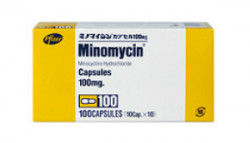Minomycin (minocycline) Coupons, Discounts & Cost
Minomycin (minocycline) is a drug with minocycline hydrochloride as active ingredient (class of tetracycline antibiotics). One way to save money on the Minomycin retail cost regardless of income and insurance status is to use Minomycin coupons or discount cards from RXCoupons. Use this Minocycline coupon at this online pharmacy and receive up to 75% off the sale price.
What do I need to know about Minomycin?
Minomycin (minocycline) is a drug with minocycline hydrochloride as active ingredient (class of tetracycline antibiotics). This is a semisynthetic antibiotic with bacteriostatic effect. Minocycline enters the tissues and organs no later than 40 minutes after administration. This substance can be found in the spleen, kidneys, pleural fluids, frontal sinuses and synovial exudates.
The drug is indicated for the following diseases: acne, gonorrhea, syphilis, brucellosis, typhoid fever, typhus, skin infections, sore throat, cholera, conjunctivitis, respiratory tract infections, infections of the cervical canal, trachoma, urethritis, psittacosis. The drug is widely used in case of severe and very severe forms of acne.
Minocycline can be used in combination therapy in the case of acute intestinal amebiasis.
Minocycline may be used as adjunctive therapy in severe acne.
Minocycline is not recommended for the treatment of meningococcal infections.
How should I take Minomycin?
This drug should be taken after meals with water. The daily dose of the drug is set by the physician. The average daily dose for an adult is 100-200 mg. It is necessary to avoid exceeding the maximum daily dose of 400 mg. The recommended daily dose for children under the age of 8 is of 4 mg/kg, and then - 2 mg/kg every 12 hours.
The initial dose for adult patients may reach 200 mg per day. After that, it is necessary to take the pills twice daily (every 12 hours) at a dose of 100 mg.
The duration of treatment in case of acne is 1.5-3 months. The daily dose is of 50 mg (one capsule of 50 mg).
Infections of the urinary tract caused by Chlamydia and Ureaplasma: 100 mg (one capsule or two capsules of 50 mg) every 12 hours for 7-10 days.
Inflammatory diseases of the pelvic organs in women in the acute stage: 100 mg every 12 hours (sometimes in combination with cephalosporins).
Syphilis in patients hypersensitive to penicillin: 100 mg twice a day for 10-15 days.
Gonorrhea: 100 mg twice a day for 4-5 days, or 300 mg as a single dose.
Uncomplicated gonococcal infections (excluding urethritis and anorectal infection) in men: initial dose - 200 mg every 12 hours for at least 4 days.
It should be noted that persons who are not suffering from kidney dysfunction should continue taking this drug. Patients with renal failure should use this drug with caution (to prevent the occurrence of acidosis, azotemia and hyperphosphatemia). The daily dose of the drug for such patients should not exceed 200 mg.
What should I discuss with my doctor before taking Minomycin?
Minomycin (minocycline) is contraindicated in the following cases: hepatic and renal failure, glucose-galactose malabsorption, leucopenia, systemic lupus erythematosus, increased sensitivity to minocycline and tetracycline, lactose intolerance. The drug is not prescribed during pregnancy and lactation, as well as for children under 8 years of age.
Minomycin should not be mixed with any kind of alcohol. Low doses should be used in patients with liver or kidney failure. It is necessary to avoid overdosing. The most characteristic symptoms of overdose include vomiting and dizziness. It is advisable to stop taking this medication in case of overdose symptoms.
What are the possible side effects for Minomycin?
Digestive system: anorexia, nausea, vomiting, diarrhea, dyspepsia, stomatitis, glossitis, dysphagia, enterocolitis, pseudomembranous colitis, pancreatitis, hyperbilirubinemia, cholestasis, hepatitis.
Genitourinary system: vulvovaginal candidiasis, interstitial nephritis.
Skin: alopecia, erythema nodosum, pruritus, toxic epidermal necrosis, vasculitis, maculo-papular and erythematous rash, Stevens-Johnson syndrome, exfoliative dermatitis.
Respiratory tract: dyspnea, bronchospasm, exacerbation of asthma, pneumonia.
Musculoskeletal system: arthralgia, arthritis, swelling of joints, muscle pain (myalgia).
Allergic reactions: urticaria, angioneurotic edema, polyarthralgia, anaphylactic reactions (including shock), pericarditis, systemic lupus erythematosus.
Hematopoiesis: agranulocytosis, hemolytic anemia, thrombocytopenia, leukopenia, pancytopenia, eosinophilia.
Central nervous system: convulsions, dizziness, vertigo, increased intracranial pressure in adults, and headaches.
Minomycin storage conditions
Minocycline is stored in dry, dark place inaccessible to children at a temperature not exceeding 25° C.

